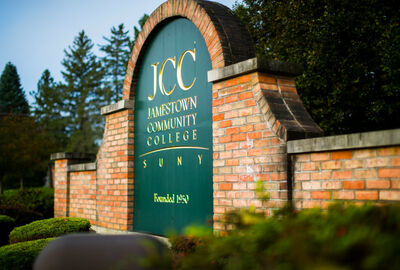Incarcerated individuals at Collins Correctional Facility will have an opportunity to obtain a college degree through a first-time partnership with SUNY Jamestown Community College.
The U.S. Department of Education announced a third round of the Second Chance Pell Experiment in April 2022. Crystal Rose-Williams, JCC’s assistant vice president of Academic Affairs and director of out-of-area initiatives, learned of an opportunity to gain the federal funding that would bring community colleges into prisons. With a commitment to making education accessible for all, JCC got onboard.
The expansion brought the number of schools participating in the project nationally to 200, with an ultimate goal of enhancing public safety, strengthening communities and the economy, by preparing incarcerated individuals to be more resilient upon their return into the community.
Studies show providing education in prison reduces the likelihood an individual will become a repeat offender. This increases public safety, and saves taxpayer dollars, as a 2018 study from the RAND corporation estimated that for every dollar spent in correctional education programs, four to five dollars are saved on three-year reincarceration costs.
“We identified three different programs to offer initially, the Language, Literature & Writing degree, and the Social Sciences degree, and then we added the Healthcare Studies certificate,” Rose-Williams said. “We started redeveloping the curriculum to once again be paper based, as currently there is limited technology for the college program, and officially launched it for the spring 2023 semester.”
The program is supported by SUNY and is aligned with SUNY’s vision to work with all 64 member campuses, CUNY, DOCCS, the New York state prison education community, and the New York State government to ensure equitable access to higher education in all of New York’s state prisons and support justice-involved individuals in their academic and professional endeavors during their incarceration and after release. According to Robin Gabel, coordinator of prison education for JCC, nearly 50 potential students were initially interested in the program.
“They have to show initiative and that they’re modeling nonviolence and respect in the jail,” Gabel explained. “Other incarcerated individuals in the corrections system can be inspired by the college students, and realize that their actions are a factor if they want to get into the program. That contributes to creating a safer environment within the facility.”
A 2009 report from the Correctional Association of New York found there were lower incidents of disciplinary infractions when college classes are offered in prisons. Moreover, the staff interviewed for the report believed the impact extended to those not involved in the programs, because the existence of the classes provided positive motivation for self improvement.
“One of the benefits to SUNY being involved in the program is that as students leave a prison or the prison system, they can go to another college within the SUNY system and complete their program,” Rose-Williams said. “If someone starts the program and has several credits under their belt, they’re more likely to go back into the community and decide to continue the education they’ve already started.”
In Illinois, the Northwestern Prison Education Program has been providing education to incarcerated students since 2018. They have found in addition to the substantial reduction in violence and disciplinary infractions, prison education also breaks down racial and ethnic barriers that can lead to violence, significantly improves relations between facility staff and the incarcerated, and enhances self esteem.
“Success looks different for everyone,” said Daniel DeMarte, president of SUNY JCC. “We’re pleased to be able to provide a new pathway for these students — and in the process eliminate a barrier for them, and the communities in which they can thrive.”

